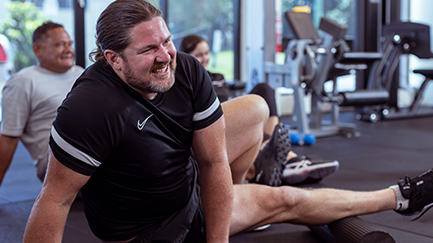
Supporting veterans through service related injuries
The Mates4Mates physical rehabilitation team is here to help veterans improve mobility, manage pain and enhance their overall wellbeing.

There are over 3.37 million Australians living with chronic pain. Almost 50% of those living with chronic pain also experience depression or anxiety, with major depression associated with reduced function, poor treatment response, and increased health care costs.
According to Pain Australia (2020), chronic pain is defined as long-lasting pain that goes on for more than three months, or past normal tissue healing time and will usually involve the pain system becoming overprotective. This means that you can have pain even when your tissues are in fact ‘safe’. This occurs because, like every other nervous system function, the pain system can learn over time to be more effective at protecting a certain body part.
Chronic pain varies across patients. It can be a symptom of other disease, or it can be a stand-alone condition.
Chronic pain:
Many people with pain fear exercise as they worry it could cause an exacerbation of their pain or injury. Research suggests, however, that regular stretching and exercising decreases pain and discomfort. It prepares the body for other activities, and it can strengthen weak muscles. It is important to start slowly and build up or increase your stretching and exercising.
Exercise not only has specific benefits in reducing the severity of chronic pain, but also contributes to the general benefits associated with improved overall physical and mental health. Furthermore, research by Pain Australia (2020) found that exercise can improve the physical functioning of people with chronic pain who are also suffering from depression, deconditioning, and obesity.
Chronic pain or persistent pain is less about the structural or tissue damage and more about the sensitivity of the nervous system and non-tissue related factors. Often when we experience chronic pain, we avoid activity to avoid pain flare ups. Research, however, shows that gradually over time, people experiencing chronic pain become less able to complete activities which were previously enjoyed, such as walking. On top of this, it is common to also have difficulties in completing activities of daily living such as housework. Studies have shown that simple exercises can be an effective way to reverse this downward cycle of deconditioning and worsening pain. Research by Daenen (2014) suggests that gradually over time, exercise can help those with chronic pain engage more in activities of enjoyment and essential activities of daily living with greater ease.
Exercise physiologists (EPs) are trained in understanding and managing chronic pain and can assist with developing programs to suit the individual needs. The team at Mates4Mates are here to provide you with a safe environment to engage in exercise. If you want to get started on an exercise program to help manage your chronic pain, get in touch with one of our experienced EPs.
Read more about chronic pain and exercise in Part 2 here.
Written by Clinical Lead – Physical Recovery, Daniela Rossi.
References

The Mates4Mates physical rehabilitation team is here to help veterans improve mobility, manage pain and enhance their overall wellbeing.